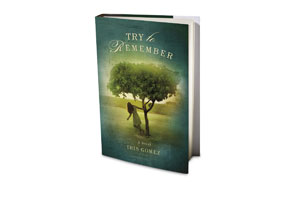Reading Questions for Try to Remember
Warning: May contain spoilers

Photo: Studio D
1. Gabriela, Evi, and Roberto betray one another at pivotal moments throughout this novel. How do these betrayals transform the characters and illuminate the difference between love and loyalty in relationships?
2. At one point in the novel, Gabriela is introduced to the four forms of love—storge, philos, eros, and agape—in the Greek classification system and later comes to wonder whether the four are equally as important. Is this question ultimately resolved in the novel?
3. Roberto's immigration experience is depicted as more difficult in certain ways than that of other family members. How do his and his family's acculturation difficulties affect their ability to distinguish what is "normal" behavior from what is not when he begins to change?
4. Why do the characters in this family go to such lengths to avoid exposing Roberto's mental illness to the outside world? Are there external social factors that drive some immigrant families to hide their problems and avoid seeking help from institutions designed to help them, such as the police, child protection agencies, and welfare providers?
5. Gabriela's beliefs about adult womanhood are formed in part by her exposure to two significant role models—her traditional mother, Evi, and the nontraditional or "feminist" model, Lara. What do Gabriela's observations about both of these characters' compromises in relationships with men teach her about her path and choices as a woman?
6. The deportation threat faced by this family of lawful immigrants illustrates the fragility of lawful permanent residents' membership in the society that they've ostensibly been permitted to join permanently. Is Gabriela's belief that this is a "double standard" the reason she chooses to disobey some laws later on in the story?
7. South Florida, especially the Miami metropolitan area, undergoes a major transformation during the time frame of the novel (1968-1971). Which of these changes, both positive and negative, affect Gabriela the most and why? What insights does she gain as a result of her interactions with Cuban and Jewish people that help shape her own identity?
8. Gabriela's struggle with her losses launches her on a quest to understand and preserve the cultures of disappearing civilizations throughout the world. What, in the experience of loss, fuels this passion in her?
Read O's review
Get more reading guides
2. At one point in the novel, Gabriela is introduced to the four forms of love—storge, philos, eros, and agape—in the Greek classification system and later comes to wonder whether the four are equally as important. Is this question ultimately resolved in the novel?
3. Roberto's immigration experience is depicted as more difficult in certain ways than that of other family members. How do his and his family's acculturation difficulties affect their ability to distinguish what is "normal" behavior from what is not when he begins to change?
4. Why do the characters in this family go to such lengths to avoid exposing Roberto's mental illness to the outside world? Are there external social factors that drive some immigrant families to hide their problems and avoid seeking help from institutions designed to help them, such as the police, child protection agencies, and welfare providers?
5. Gabriela's beliefs about adult womanhood are formed in part by her exposure to two significant role models—her traditional mother, Evi, and the nontraditional or "feminist" model, Lara. What do Gabriela's observations about both of these characters' compromises in relationships with men teach her about her path and choices as a woman?
6. The deportation threat faced by this family of lawful immigrants illustrates the fragility of lawful permanent residents' membership in the society that they've ostensibly been permitted to join permanently. Is Gabriela's belief that this is a "double standard" the reason she chooses to disobey some laws later on in the story?
7. South Florida, especially the Miami metropolitan area, undergoes a major transformation during the time frame of the novel (1968-1971). Which of these changes, both positive and negative, affect Gabriela the most and why? What insights does she gain as a result of her interactions with Cuban and Jewish people that help shape her own identity?
8. Gabriela's struggle with her losses launches her on a quest to understand and preserve the cultures of disappearing civilizations throughout the world. What, in the experience of loss, fuels this passion in her?
Read O's review
Get more reading guides



